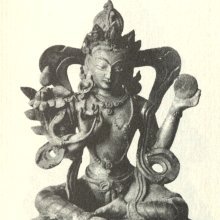Riddhi, Ṛddhī, Ṛddhi: 37 definitions
Introduction:
Riddhi means something in Buddhism, Pali, Hinduism, Sanskrit, Jainism, Prakrit, the history of ancient India, Marathi, Hindi, biology. If you want to know the exact meaning, history, etymology or English translation of this term then check out the descriptions on this page. Add your comment or reference to a book if you want to contribute to this summary article.
The Sanskrit terms Ṛddhī and Ṛddhi can be transliterated into English as Rddhi or Riddhi, using the IAST transliteration scheme (?).
Alternative spellings of this word include Hriddhi.
Images (photo gallery)
In Hinduism
Ayurveda (science of life)
Rasashastra (Alchemy and Herbo-Mineral preparations)
Source: Wisdom Library: Rasa-śāstraṚddhī (ऋद्धी):—One of the sixty-seven Mahauṣadhi, as per Rasaśāstra texts (rasa literature). These drugs are useful for processing mercury (rasa), such as the alchemical processes known as sūta-bandhana and māraṇa.
Source: History of Science in South Asia: Making Gems in Indian Alchemical LiteratureṚddhi (ऋद्धि) refers to “extraordinary knowledge and powers” of the Rasaratnākara (lit. “jewel mine of mercury”): a 13th century alchemical work in Sanskrit written by Nityanātha.—The Rasaratnākara consists of five parts (khaṇḍas). The twenty chapters of the third section [i.e., the vādakhaṇda] cover a range of topics, including the initiation of the alchemical student, the set up of the laboratory and its inventory, etc. [...] The Vādakhaṇḍa is also known as the Vādikhaṇḍa (“to the learned”) and Ṛddhi-khaṇḍa (“to extraordinary knowledge and powers”).
Kalpa (Formulas, Drug prescriptions and other Medicinal preparations)
Source: Shodhganga: Edition translation and critical study of yogasarasamgrahaṚddhi (ऋद्धि) refers to the medicinal plant known as “Habenaria edgeworthii Hook. f. ex Collett.” and is dealt with in the 15th-century Yogasārasaṅgraha (Yogasara-saṅgraha) by Vāsudeva: an unpublished Keralite work representing an Ayurvedic compendium of medicinal recipes. The Yogasārasaṃgraha [mentioning ṛddhi] deals with entire recipes in the route of administration, and thus deals with the knowledge of pharmacy (bhaiṣajya-kalpanā) which is a branch of pharmacology (dravyaguṇa).
Nighantu (Synonyms and Characteristics of Drugs and technical terms)
Source: WorldCat: Rāj nighaṇṭuṚddhi (ऋद्धि) is the Sanskrit name for an unidentified medicinal plant, according to verse 5.28-33 of the 13th-century Raj Nighantu or Rājanighaṇṭu. Notes: Also see Vṛddhi. On the name of Ṛddhi and Vṛddhi the Habenaria species are being supplied in the market (Th. B.S. et al. and P.V.S.). Th. B.S. suggests another species for consideration and investigation i.e. Ciraiyākanda or Mālākanda (Eulophia nuda Lindl.).—The tuberous roots of Ṛddhi and Vṛddhi are covered in a sheath. These tubers are white, hairy, porous. The main plant is a creeper.
Ṛddhi is mentioned as having eleven synonyms: Siddhi, Prāṇadā, Jīvadātrī, Siddhā, Yogyā, Cetanīyā, Rathāṅgī, Maṅgalyā, Lokakāntā, Yaśasyā and Jīvaśreṣṭhā.
Properties and characteristics: “Both Ṛddhi and Vṛddhi are sweet, bitter, cold and unctuous. They improve appetite and mental power. Both are good anthelmintics and control kuṣṭha (leprosy and allied skin diseases) and kapha. In the preparations of fomularies any one of these may serve the purpose according to needs. Their simultaneous use is advised, where both of these are available”.
Unclassified Ayurveda definitions
Source: eJournal of Indian Medicine: Jajjaṭa’s Nirantarapadavyākhyā and Other Commentaries on the CarakasaṃhitāṚddhi (ऋद्धि) refers to Habenaria edgeworthii Hook.f. ex Collett., and is the name of a medicinal plant mentioned in the 7th-century Nirantarapadavyākhyā by Jejjaṭa (or Jajjaṭa): one of the earliest extant and, therefore, one of the most important commentaries on the Carakasaṃhitā.—(Cf. Indian Medicinal Plants, Arya Vaidya Sala 3:110, 1993-96.).—Habenaria edgeworthii Hook.f. ex Collett is a synonym of Platanthera edgeworthii (Hook.f. ex Collett) R.K.Gupta.—(Cf. The Plant List, A Working List of All Plant Species, Royal Botanic Gardens, Kew and Missouri Botanical Garden).—Note: “This is one of the drugs of aṣṭavarga which have not been identified as yet. Vārāhīkanda was recommended as a substitute by Bāva Miśra…”.—(Cf. Glossary of Vegetable Drugs in Bṛhattrayī 55, Singh and Chunekar, 1999)

Āyurveda (आयुर्वेद, ayurveda) is a branch of Indian science dealing with medicine, herbalism, taxology, anatomy, surgery, alchemy and related topics. Traditional practice of Āyurveda in ancient India dates back to at least the first millenium BC. Literature is commonly written in Sanskrit using various poetic metres.
Shaktism (Shakta philosophy)
Source: Wisdom Library: ŚāktismṚddhi (ऋद्धि, “successful, magical”):—Name of one of the sixty-four mātṛs to be worshipped during Āvaraṇapūjā (“Worship of the Circuit of Goddesses”, or “Durgā’s Retinue”), according to the Durgāpūjātattva. They should be worshipped with either the five upācāras or perfume and flowers.
Her mantra is as follows:
ॐ ऋद्ध्यै नमः
oṃ ṛddhyai namaḥ.

Shakta (शाक्त, śākta) or Shaktism (śāktism) represents a tradition of Hinduism where the Goddess (Devi) is revered and worshipped. Shakta literature includes a range of scriptures, including various Agamas and Tantras, although its roots may be traced back to the Vedas.
Purana and Itihasa (epic history)
Source: archive.org: Puranic EncyclopediaṚddhi (ऋद्धि).—Varuṇa’s wife. (Mahābhārata Udyoga Parva, Chapter 117, Verse 9).
Source: archive.org: Shiva Purana - English TranslationṚddhi (ऋद्धि) refers to “one’s assets”, according to the Śivapurāṇa 2.3.36 (“The statements of the seven sages”).—Accordingly, as Himavat (Himācala) said to the mountains: “O fortunate sages, please listen to my words. All my bewilderment has vanished since I have heard the story of Śiva and Śiva. Everything that I possess, my body, wife, Menā, sons, daughter, assets (ṛddhi) and achievements and other things belong to Śiva and not otherwise”.
Source: Cologne Digital Sanskrit Dictionaries: The Purana Index1a) Ṛddhi (ऋद्धि).—The wife of Kubera; a brahmakalā; mother of Nalakūbara.*
- * Brahmāṇḍa-purāṇa III. 8. 46; IV. 35. 94; Vāyu-purāṇa 70. 41.
1b) A deity attendant on Vināyaka.*
- * Matsya-purāṇa 260. 55.

The Purana (पुराण, purāṇas) refers to Sanskrit literature preserving ancient India’s vast cultural history, including historical legends, religious ceremonies, various arts and sciences. The eighteen mahapuranas total over 400,000 shlokas (metrical couplets) and date to at least several centuries BCE.
Kavyashastra (science of poetry)
Source: Shodhganga: Bhismacaritam a critical studyṚddhi (ऋद्धि) is the name of a Sanskrit metre (chandas) [defined as उ.इ.उ.उ] of the Upajāti type as employed in the Bhīṣmacarita (Bhishma Charitra) which is a mahākāvya (‘epic poem’) written by Hari Narayan Dikshit.—We find sixteen examples of Rāmā variety of Ṛddhi metre in the Bhīṣmacarita. The example of it is verse IV.5. [...] The other examples are as follows: IV.33, IV.36, IV.41, IV.43, IV.44, X.24, X.32, X.41, X.42, XI.9, XI.39, XIV.2, XIV.19, XIV.32 and XIV.55.

Kavyashastra (काव्यशास्त्र, kāvyaśāstra) refers to the ancient Indian tradition of poetry (kavya). Canonical literature (shastra) of the includes encyclopedic manuals dealing with prosody, rhetoric and various other guidelines serving to teach the poet how to compose literature.
General definition (in Hinduism)
Source: Wisdom Library: HinduismṚddhi (ऋद्धि, “prosperity”):—Name of the younger of two wifes of Varuṇa, who is the presiding deity of the invisible world and represents the inner reality of things.
In Buddhism
Mahayana (major branch of Buddhism)
Source: Wisdom Library: Maha Prajnaparamita SastraṚddhi (ऋद्धि) or Ṛddhyabhijñā refers to “magical powers” and represents one of the five superknowledges (pañcābhijñā) according to the 2nd century Mahāprajñāpāramitāśāstra chapter X. It includes the four kinds of gamana or movement, nirmāṇa or creation and āryaṛddhi or noble magical power. Pañcābhijña represents one of the qualities possessed by the Bodhisattvas that accompanied the Buddha.
Source: academia.edu: A Study and Translation of the GaganagañjaparipṛcchāṚddhi (ऋद्धि) refers to “magical power”, according to the Gaganagañjaparipṛcchā: the eighth chapter of the Mahāsaṃnipāta (a collection of Mahāyāna Buddhist Sūtras).—Accordingly, “Then, the Lord went on to speak these verses: ‘[...] (74) By means of skill in meditation (dhyāna) and the supernormal knowledge of magical power (ṛddhi-abhijñā), they go to a great number of millions of Buddha-fields (buddhakṣetra) to make offerings to innumerable Buddhas, with a mind removed from the vice of all ignorance (sarvājñānakleśa). [...]’”.
Source: De Gruyter: A Buddhist Ritual Manual on AgricultureṚddhi (ऋद्धि) refers to “supernatural (power)”, according to the Vajratuṇḍasamayakalparāja, an ancient Buddhist ritual manual on agriculture from the 5th-century (or earlier), containing various instructions for the Sangha to provide agriculture-related services to laypeople including rain-making, weather control and crop protection.—Accordingly, “Then the Bhagavān went to the residence of Vaiśravaṇa, the Great King, with a great retinue, a great assembly-gathering, a great host, an indication of great supernatural power (ṛddhi-anubhāva), displaying great miracles”.

Mahayana (महायान, mahāyāna) is a major branch of Buddhism focusing on the path of a Bodhisattva (spiritual aspirants/ enlightened beings). Extant literature is vast and primarely composed in the Sanskrit language. There are many sūtras of which some of the earliest are the various Prajñāpāramitā sūtras.
Tibetan Buddhism (Vajrayana or tantric Buddhism)
Source: OSU Press: Cakrasamvara SamadhiṚddhi (ऋद्धि) [=ṛddhika?] refers to “powerful”, according to the Guru Mandala Worship (maṇḍalārcana) ritual often performed in combination with the Cakrasaṃvara Samādhi, which refers to the primary pūjā and sādhanā practice of Newah Mahāyāna-Vajrayāna Buddhists in Nepal.—Accordingly, “Great guardians beginning with Indra, Lokapālas very powerful (mahā-ṛddhika), Gods standing in the ten directions, Lokapālas I give homage. Indra holding a vajra, with the divine hosts, seize this excellent offering. [...]”.

Tibetan Buddhism includes schools such as Nyingma, Kadampa, Kagyu and Gelug. Their primary canon of literature is divided in two broad categories: The Kangyur, which consists of Buddha’s words, and the Tengyur, which includes commentaries from various sources. Esotericism and tantra techniques (vajrayāna) are collected indepently.
General definition (in Buddhism)
Source: Wisdom Library: Dharma-samgrahaṚddhi (ऋद्धि) refers to “spiritual power” and represents one of the “five deep knowledges” (pañcābhijñā) as defined in the Dharma-saṃgraha (section 20). The Dharma-samgraha (Dharmasangraha) is an extensive glossary of Buddhist technical terms in Sanskrit (e.g., pañca-abhijñāu and ṛddhi). The work is attributed to Nagarjuna who lived around the 2nd century A.D.
Ṛddhi or Ṛddhivaśitā refers to the “mastery of spiritual power” and represents one of the “ten masteries of the Bodhisattvas” (vaśitā) as defined in the Dharma-saṃgraha (section 74).
Ṛddhi or Ṛddhiprātihārya refers to the “miracle of spiritual power” and represents one of the “three kinds of miracles” (prātihārya) as defined in the Dharma-saṃgraha (section 133).
In Jainism
General definition (in Jainism)
Source: archive.org: Jaina YogaṚddhi (ऋद्धि, “wealth”) as in ṛddhi-mada refers to “pride in one’s wealth” and represents one of the eight forms of vainglory (mada), according to Samantabhadra in his Ratna-Karaṇḍa-śrāvakācāra (with commentary of Prabhācandra). These eight madas are included in the twenty-five blemishes (dṛg-doṣas), which are generally held to be the eight madas, the three mūḍhatās, the six anāyatanas, and the eight doṣas.
Source: archive.org: TrisastisalakapurusacaritraṚddhi (ऋद्धि) or Ṛddhigaurava refers to “(the vanity of) riches”, according to chapter 1.1 [ādīśvara-caritra] of Hemacandra’s 11th century Triṣaṣṭiśalākāpuruṣacaritra: an ancient Sanskrit epic poem narrating the history and legends of sixty-three illustrious persons in Jainism.—Accordingly, in the sermon of Sūri Dharmaghoṣa:—“[...] the gift of supporting dharma (dharmopagrahadāna) is five-fold: purity of giver, receiver, gift, time, and thought. [... ] That gift would have purity of receiver, whose receiver is such a man [who is] lacking in three vanities (gaurava) [viz., ṛddhi-gaurava], [...]”.—(Cf. Samavāyāṅgasūtra 3, p. 9a. Uttarādhyayana 31.4).
Source: Encyclopedia of Jainism: Tattvartha Sutra 3: The Lower and middle worldsṚddhi (ऋद्धि).—How many types of “extraordinary powers” (ṛddhis) are there? Some ascetics attain extraordinary powers to produce worldly miracles. Such attainments are called ṛddhi.
Ṛddhi (extraordinary powers) is of eight types, namely:
- intellect (buddhi),
- activity (kriyā),
- change of form (vikriyā),
- austerity (tapas),
- might (bala),
- healing power (auṣadhi),
- occult power to change food (rasa).
- power to ensure inexhaustible food and space (kṣetra).
The word extraordinary is attached as a prefix to each of these eight types.
Ṛddhi (ऋद्धि) refers to the “(great) power” (of the lord of the 30 gods), according to the 11th century Jñānārṇava, a treatise on Jain Yoga in roughly 2200 Sanskrit verses composed by Śubhacandra.—Accordingly, “If it is exceedingly desired to avoid descending into hell or solely to obtain the great power of the lord of the 30 gods (tridaśapati-mahā-ṛddhi), if the ultimate aim of a man is desirable, then, pray, what else is to be spoken of? You must perform the doctrine. [Thus ends the reflection on] the doctrine”.

Jainism is an Indian religion of Dharma whose doctrine revolves around harmlessness (ahimsa) towards every living being. The two major branches (Digambara and Svetambara) of Jainism stimulate self-control (or, shramana, ‘self-reliance’) and spiritual development through a path of peace for the soul to progess to the ultimate goal.
India history and geography
Source: Cologne Digital Sanskrit Dictionaries: Indian Epigraphical GlossaryṚddhi.—(EI 3), supernatural power. Note: ṛddhi is defined in the “Indian epigraphical glossary” as it can be found on ancient inscriptions commonly written in Sanskrit, Prakrit or Dravidian languages.

The history of India traces the identification of countries, villages, towns and other regions of India, as well as mythology, zoology, royal dynasties, rulers, tribes, local festivities and traditions and regional languages. Ancient India enjoyed religious freedom and encourages the path of Dharma, a concept common to Buddhism, Hinduism, and Jainism.
Biology (plants and animals)
Source: Wisdom Library: Local Names of Plants and DrugsRiddhi [ऋद्धि] in the Hindi language is the name of a plant identified with Platanthera edgeworthii (Hook.f. ex Collett) R.K.Gupta from the Orchidaceae (Orchid) family having the following synonyms: Habenaria edgeworthii. For the possible medicinal usage of riddhi, you can check this page for potential sources and references, although be aware that any some or none of the side-effects may not be mentioned here, wether they be harmful or beneficial to health.
Riddhi in the Tamil language, ibid. previous identification.
Riddhi in the Malayalam language, ibid. previous identification.
Riddhi in the Telugu language, ibid. previous identification.
Riddhi in the Kannada language, ibid. previous identification.
Riddhi [ऋद्धि] in the Sanskrit language, ibid. previous identification.
Riddhi [रिद्धि] in the Hindi language is the name of a plant identified with Habenaria intermedia from the Orchidaceae (Orchid) family having the following synonyms: Ochyrorchis intermedia, Kryptostoma intermedium.
Source: Google Books: CRC World Dictionary (Regional names)Riddhi in India is the name of a plant defined with Platanthera edgeworthii in various botanical sources. This page contains potential references in Ayurveda, modern medicine, and other folk traditions or local practices It has the synonym Habenaria edgeworthii Hook.f. ex Collett (among others).
Example references for further research on medicinal uses or toxicity (see latin names for full list):
· Taxon (1981)
· Acta Phytotaxonomica Sinica (1998)
· Richardiana (2004)
· Flora Simlensis (1902)
· Richardiana (2006)
· Fl. Nainital. (1968)
If you are looking for specific details regarding Riddhi, for example chemical composition, health benefits, pregnancy safety, extract dosage, diet and recipes, side effects, have a look at these references.

This sections includes definitions from the five kingdoms of living things: Animals, Plants, Fungi, Protists and Monera. It will include both the official binomial nomenclature (scientific names usually in Latin) as well as regional spellings and variants.
Languages of India and abroad
Marathi-English dictionary
Source: DDSA: The Molesworth Marathi and English Dictionaryṛddhi (ऋद्धि).—f S Prosperous or thriving state. 2 Prosperity, riches, affluence.
--- OR ---
riddhi (रिद्धि).—f (Properly ddhi S) Wealth, riches, substance.
Source: DDSA: The Aryabhusan school dictionary, Marathi-Englishṛddhi (ऋद्धि).—f Prosperous state. Prosperity, riches.
--- OR ---
riddhi (रिद्धि).—f Wealth. riddhisiddhi f Prosperity and perfection.
Marathi is an Indo-European language having over 70 million native speakers people in (predominantly) Maharashtra India. Marathi, like many other Indo-Aryan languages, evolved from early forms of Prakrit, which itself is a subset of Sanskrit, one of the most ancient languages of the world.
Sanskrit dictionary
Source: DDSA: The practical Sanskrit-English dictionaryṚddhi (ऋद्धि).—f. [ṛdh-bhāve ktin]
1) Growth, increase. नियमर्द्धये (niyamarddhaye) Bhāgavata 12.8.9.
2) Success, prosperity; affluence, good fortune. तेषामृद्धिरतीवात्र (teṣāmṛddhiratīvātra) Bhāgavata 3.139.8.
3) Elevation, exaltation, greatness. संजीवितः शिशुरसौ मम चेयमृद्धिः (saṃjīvitaḥ śiśurasau mama ceyamṛddhiḥ) Uttararāmacarita 2.11.
4) (a) Extent, magnitude, excellence; परिच्छिन्नप्रभावर्द्धिर्न मया न च विष्णुना (paricchinnaprabhāvarddhirna mayā na ca viṣṇunā) Kumārasambhava 2.58. (b) Grandeur, magnificence; व्यक्तर्धि वः क्रीडितम् (vyaktardhi vaḥ krīḍitam) Mālatīmādhava (Bombay) 5.22.
5) Supernatural power or supremacy, perfection.
6) Accomplishment.
7) Prosperity personified as the wife of Kubera.
8) Name of Pārvatī, and of Lakṣmī.
9) Name of a medicinal plant; (Mar. kevaṇī, muruḍaśeṃga)
1) magic; M. W.
Derivable forms: ṛddhiḥ (ऋद्धिः).
Source: Cologne Digital Sanskrit Dictionaries: Edgerton Buddhist Hybrid Sanskrit DictionaryṚddhi (ऋद्धि).—f. (= Sanskrit id., Pali iddhi), supernatural or magic power, hardly significantly different from its Sanskrit use; ṛddhi-vaśitā Mahāvyutpatti 779, one of the 10 vaśitā of a Bodhisattva; knowledge of ṛ° is the fifth abhijñā, q.v.; ṛddhi-prātihārya, see prāti°; ṛddhi-balatā and -vaśitā, Mahāvastu iii.67.2; aiśvarya-ṛ° Mahāvastu ii.166.8 simply the magic power of aiśvarya, as in Sanskrit (otherwise Senart); see ṛddhi-pāda separately.
--- OR ---
Riddhi (रिद्धि).—possibly intended at Mahāvastu ii.322.1 for ṛddhi; see s.v. iddhi; in prose of Divyāvadāna 133.10; 134.15, 17, 20; 144.1; 160.25 f., always after a final vowel; sva-riddhi- (Ārya-)Mañjuśrīmūlakalpa 6.7 (prose).
Source: Cologne Digital Sanskrit Dictionaries: Shabda-Sagara Sanskrit-English DictionaryṚddhi (ऋद्धि).—f.
(-ddhiḥ) 1. A medicinal plant; also siddhi. 2. Increase, growth. 3. Fortune, prosperity. 4. A name of the goddess Parvati. E. ṛdha to grow, &c., ktin aff.
Source: Cologne Digital Sanskrit Dictionaries: Benfey Sanskrit-English DictionaryṚddhi (ऋद्धि).—i. e. ṛdh + ti, f. 1. Plenty, [Indralokāgamana] 5, 26. 2. Wealth, [Kumārasaṃbhava, (ed. Stenzler.)] 2, 58. 3. Prosperity, [Rāmāyaṇa] 2, 105, 33. 4. Perfection, [Bhāgavata-Purāṇa, (ed. Burnouf.)] 9, 21, 12. 5. The deity of wealth, Mahābhārata 13. 6750.
Source: Cologne Digital Sanskrit Dictionaries: Cappeller Sanskrit-English DictionaryṚddhi (ऋद्धि).—[feminine] success, prosperity, welfare, happiness, perfection.
Source: Cologne Digital Sanskrit Dictionaries: Monier-Williams Sanskrit-English Dictionary1) Ṛddhi (ऋद्धि):—[from ṛdh] f. increase, growth, prosperity, success, good fortune, wealth, abundance, [Vājasaneyi-saṃhitā; Taittirīya-saṃhitā; Śatapatha-brāhmaṇa; Āśvalāyana-gṛhya-sūtra] etc. (personified as Kuvera’s wife, [Mahābhārata; Harivaṃśa])
2) [v.s. ...] accomplishment, perfection, supernatural power, [Bhāgavata-purāṇa; Lalita-vistara] etc.
3) [v.s. ...] magic
4) [v.s. ...] a kind of medicinal plant, [Bhāvaprakāśa; Caraka]
5) [v.s. ...] Name of Pārvatī, [cf. Lexicographers, esp. such as amarasiṃha, halāyudha, hemacandra, etc.]
6) [v.s. ...] of Lakṣmī, [cf. Lexicographers, esp. such as amarasiṃha, halāyudha, hemacandra, etc.]
7) [v.s. ...] ([Vājasaneyi-saṃhitā; ]also) Name of Gaṇeśa’s wife, [Religious Thought and Life in India 215]
Source: Cologne Digital Sanskrit Dictionaries: Yates Sanskrit-English DictionaryṚddhi (ऋद्धि):—(ddhiḥ) 2. f. Wealth; a plant.
Source: DDSA: Paia-sadda-mahannavo; a comprehensive Prakrit Hindi dictionary (S)Ṛddhi (ऋद्धि) in the Sanskrit language is related to the Prakrit word: Iḍḍha.
[Sanskrit to German]
Sanskrit, also spelled संस्कृतम् (saṃskṛtam), is an ancient language of India commonly seen as the grandmother of the Indo-European language family (even English!). Closely allied with Prakrit and Pali, Sanskrit is more exhaustive in both grammar and terms and has the most extensive collection of literature in the world, greatly surpassing its sister-languages Greek and Latin.
Hindi dictionary
Source: DDSA: A practical Hindi-English dictionaryṚddhi (ऋद्धि) [Also spelled hriddhi]:—(nf) prosperity, accomplishment; -[siddhi] wealth and prosperity.
...
Kannada-English dictionary
Source: Alar: Kannada-English corpusṚddhi (ಋದ್ಧಿ):—
1) [noun] great plenty; abundance.
2) [noun] a state characterised by abundant wealth.
3) [noun] the fact of advancing toward perfection or to a higher or better state; progress.
4) [noun] an achieving of something; accomplishment; esp. a getting supernatural powers.
5) [noun] the plant Helicteres isora of Sterculiaceae family;6) [noun] a kind of medicinal substance made from it.
Kannada is a Dravidian language (as opposed to the Indo-European language family) mainly spoken in the southwestern region of India.
See also (Relevant definitions)
Starts with (+10): Riddhibala, Riddhidatta, Riddhigaurava, Riddhika, Riddhikama, Riddhikhanda, Riddhila, Riddhilakshmi, Riddhilamatar, Riddhimamta, Riddhiman, Riddhimant, Riddhimat, Riddhipada, Riddhipadanipata, Riddhiprapta, Riddhiprapti, Riddhipratiharya, Riddhisakshatkriya, Riddhisampanna.
Ends with (+146): Abhivivriddhi, Abhivriddhi, Adhikddhi, Adhivriddhi, Adivriddhi, Agnivriddhi, Alokavriddhi, Amtravriddhi, Andavriddhi, Antarvriddhi, Antra Vriddhi, Antravriddhi, Anugriddhi, Anuvriddhi, Anvayavriddhi, Apavriddhi, Apravriddhi, Ardhavriddhi, Arghavriddhi, Arogyapravriddhi.
Full-text (+206): Adhikddhi, Ashtavarga, Paparddhi, Riddhimat, Vittarddhi, Cetaniya, Asparddhin, Garddhin, Maharddhi, Sparddhin, Karddhi, Pratisparddhin, Riddhipada, Vikramarddhi, Adhikarddhi, Adhikardhi, Rajarddhi, Parinamika, Tapas, Aushadhi.
Relevant text
Search found 50 books and stories containing Riddhi, Ṛddhī, Ṛddhi, Rddhi; (plurals include: Riddhis, Ṛddhīs, Ṛddhis, Rddhis). You can also click to the full overview containing English textual excerpts. Below are direct links for the most relevant articles:
Maha Prajnaparamita Sastra (by Gelongma Karma Migme Chödrön)
Appendix 1 - The canonical definition of ṛddhividhi-jñāna < [Chapter XLIII - The Pursuit of the Six superknowledges]
II. Order of the superknowledges < [Part 1 - Becoming established in the six superknowledges]
Appendix 1 - The Great Miracle at Śrāvastī < [Chapter XV - The Arrival of the Bodhisattvas of the Ten Directions]
Brihad Bhagavatamrita (commentary) (by Śrī Śrīmad Bhaktivedānta Nārāyana Gosvāmī Mahārāja)
Verse 2.2.137 < [Chapter 2 - Jñāna (knowledge)]
Jainism and Patanjali Yoga (Comparative Study) (by Deepak bagadia)
Part 12 - Similarities and differences of both the Philosophies in Nutshell < [Chapter 4 - A Comparative Study]
Abhidharmakośa (by Leo M. Pruden)
Jnaneshwari (Bhavartha Dipika) (by Ramchandra Keshav Bhagwat)
Verse 2.70 < [Chapter 2 - Samkhya-Yoga]
Verse 2.60 < [Chapter 2 - Samkhya-Yoga]
Verse 12.5 < [Chapter 12 - Bhakti-yoga]
Rasa Jala Nidhi, vol 1: Initiation, Mercury and Laboratory (by Bhudeb Mookerjee)
Part 8 - Mercurial operations (6): Confinement of Mercury (rodhana) < [Chapter IV-V - Mercurial operations]
Related products
(+6 more products available)







